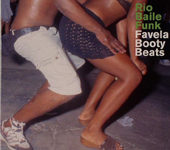|
|
 |
Dusted Reviews
Artist: V/A Album: Rio Bailie Funk: Favela Booty Beats Label: Essay Review date: Apr. 28, 2005 |

|
|
|
 |
It’s been a while since anyone’s invented a new dance beat. By all accounts, booty bass may have been the last genre to pioneer one, sleek like a Firebird with T-tops with a large, forceful, ass-shaking purpose. Some might argue that bass music is nothing but “Planet Rock” with sustained kick drums, but there’s something more at stake – something that powered a microcosm of dance music and car culture from the mid-’80s for a good 10 years to follow.
Bass is somewhat of a universal language. Renegade Soundwave told us that “Women Respond to Bass,” and few can argue with that claim. When’s the last time you were in the club with some serious bass pumpin’ and saw people just standing around? Never. It didn’t happen. Guys and girls were dancin’, dressed to sweat. They even banged their heads in some semblance of rhythm at the Sunn 0))) concert, even though there was no rhythm to be found.
And the electronic bass line, low-passed to maximum effect and augmented with crisp needling snares, tootsie-roll whistles and the like, has proved to be as durable a rhythm as any. Unlike jungle and drum & bass, which can be tracked to a JB “Funky Drummer” break sped up and tapdanced all over, or your grime/eski movement and the smoother 2-step and garage that preceded it owing a massive debt to the organic syncopation of dancehall riddims, bass music’s roots lie in a very distinct, genre-busting moment in time: Bambaataa, breaking the codes that unified “Apache” and disco dancin’ parties with the robotic moves of breakin’ and the technologies that supplanted acoustic instruments in the ’70s. The synthetic, plastic nature of the 303 and the 808 gave the tracks a futuristic, android dance-bot feel, a durable escape from the oppression and recession of the early-’80s climates that it was initially created in.
That said, the music collected on Rio Baile Funk: Favela Booty Beats will not seem like much of a revelation at the outset. The mix presented on the disc won’t open up too many hipster eyes to something they’ve overlooked before (much like how the Disco Not Disco comps helped get that five-letter word out of the sociocultural jail it had suffered in for two decades). Baile funk, born and bred in Brazil, is just as rude and unvarnished as the Miami booty beats that fuel it, but distinctively Brazilian in the sounds it samples. If you think that sounds trite, take a listen to it: prove the statement wrong. There’s a “Who Let the Dogs Out” track on here. There’s also a track called “Propozuda Rock ‘n’ Roll” that sounds as if the group behind it (De Falla) ganked the guitar riff from the opening of “Beverly Hills 90210” and built their track around it. Not a lot of science. But given Brazil’s voracity for pop culture, on par with Britain and Japan, but dialed down on the economic scale by a significant degree, the rampant sampling, low-tech loops, duct-taped segues, and cheap melody sources – which range from fanfare horns to squeezeboxes to children’s toys to Tone Loc’s crossover hit “Wild Thing” – mean that just about everything musical and with a rapid pulse is up for grabs, and that unpredictability makes the music exciting.
The mix here is pretty pedestrian and it might have been more worth it to hear the tracks on their own (note: there’s a 12” sampler EP of four of the album’s cuts that does just this). Also, headphones, and most home systems for that matter, aren’t really going to do this bass music, or any others, justice; this stuff begs to be blazed in a club. All the same, Rio Baile Funk works as a booty bass record as well as a cultural artifact, the first surfacings of the music of Brazil’s notorious favelas above the equator. Those looking to have their horizons broadened will be searching high and low in this disc, and may come up empty. Then again, it’s less about learning, and more about shakin’ what you got. So shake it and shut up.
By Doug Mosurock
|







